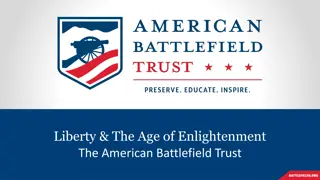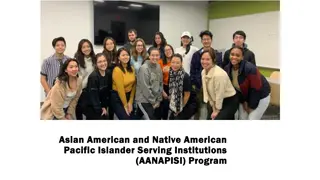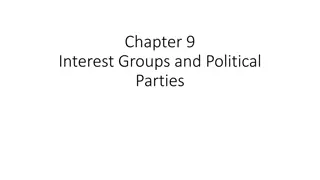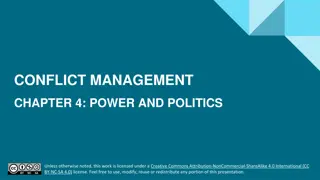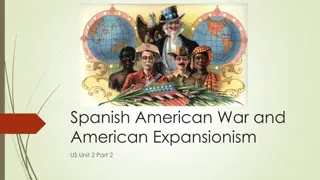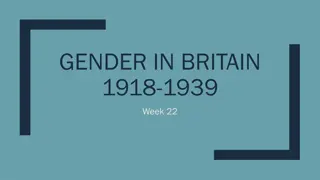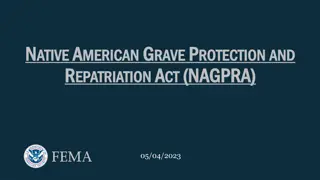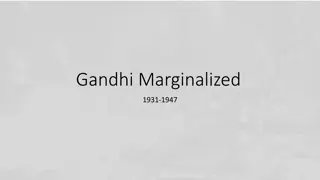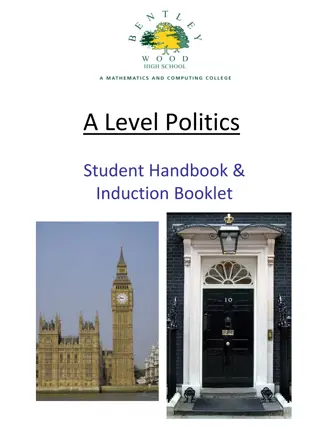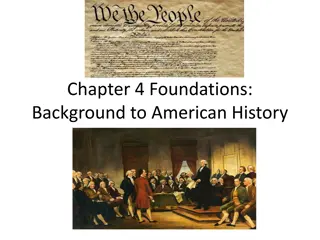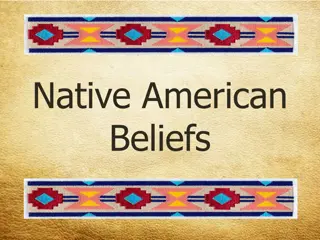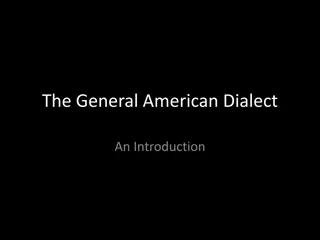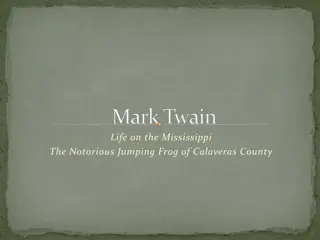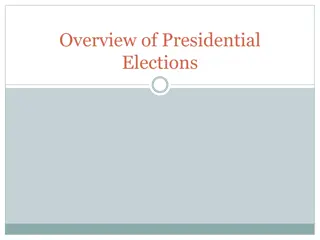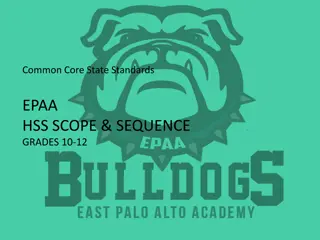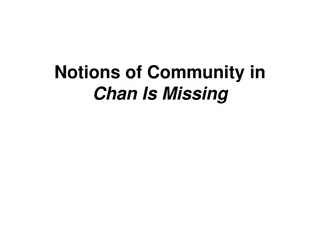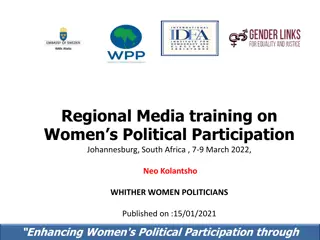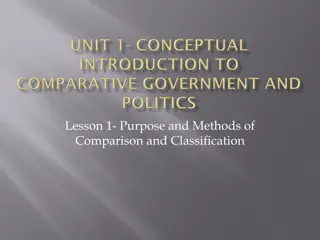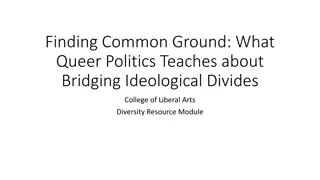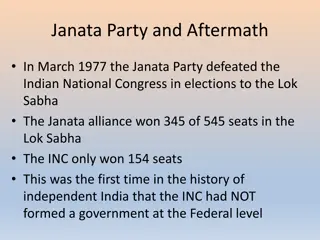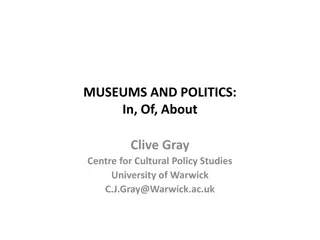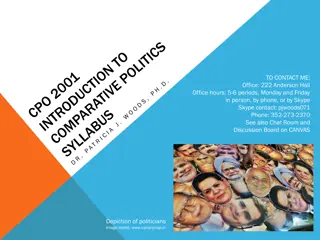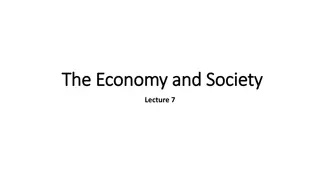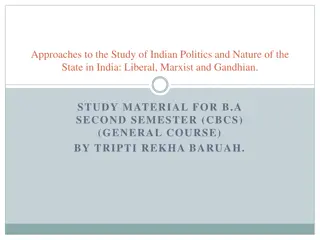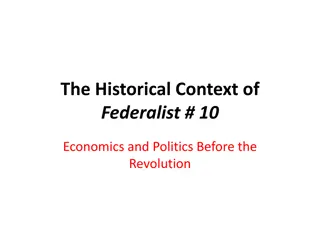Liberty & The Age of Enlightenment The American Battlefield Trust
The Age of Enlightenment, with its emphasis on natural law, liberty, progress, and constitutional government, greatly influenced American thinking and the Revolutionary War. Key figures like John Locke and Sir William Blackstone contributed ideas of social contract and law that shaped American gover
2 views • 15 slides
Zora Neale Hurston: African-American Writer of the Harlem Renaissance
Zora Neale Hurston, born in Notasulga, Alabama, in 1891, was a prominent African-American writer known for her works reflecting the African-American culture and folklore. Growing up in Eatonville, Florida, and later studying at Barnard College, she stood out among her contemporaries for her portraya
2 views • 4 slides
Overview of AANAPISI Program in the United States
The Asian American and Native American Pacific Islander Serving Institutions (AANAPISI) Program aims to support institutions with a minimum of 10% Asian American and Native American Pacific Islander undergraduate enrollment. Currently, there are 54 funded AANAPISI institutions across 16 states and t
0 views • 13 slides
Exploration of the Evolution of American Society and Culture, 1917-1990
Delve into the multifaceted facets of American society and culture from 1917 to 1990 with a deep dive into the changing roles of women, political landscape shifts, influences of immigration, impact of wars on domestic politics, economic influences, quest for civil rights, changing living standards,
0 views • 6 slides
Evolution of American English Vocabulary and Language Features
American English exhibits arachaic features and early changes in vocabulary due to colonial influences and the distinct political and administrative system. The language has preserved old-fashioned elements from the seventeenth and eighteenth centuries, while also incorporating new words inspired by
0 views • 5 slides
Understanding Interest Groups and Political Parties in American Politics
Interest groups play a significant role in American politics, aiming to influence government decisions through lobbyists and various strategies. They represent different interests such as economic, public, and intergovernmental. Lobbyists engage with federal branches and judicial institutions, utili
0 views • 7 slides
Understanding Power, Politics, and Conflict Management in Organizations
Explore the dynamics of power, authority, leadership, and politics within organizations, delving into how individuals and groups influence each other's actions and decisions. Learn about the various bases of power, common power tactics, and ethical considerations in using power and politics in the w
3 views • 23 slides
Evolution of Media Influence on Politics
The evolution of mass media and its impact on politics is explored, highlighting the important role of media events, high-tech politics, and the development of media politics through print and broadcast media. The government regulation of the broadcast media, as overseen by the FCC, is also discusse
4 views • 20 slides
Spanish-American War and American Expansionism: A Look Back in History
Explore the causes and impacts of the Spanish-American War, including the influence of Yellow Journalism, nationalism, and imperialism on American expansionism during the late 1800s. Learn about key figures like Theodore Roosevelt and the Rough Riders, and the significance of policies like the Monro
0 views • 25 slides
The Impact of Female Suffrage on Interwar Politics in Britain (1918-1939)
The period between 1918 and 1939 in Britain saw significant changes in politics, feminism, and society due to the granting of female suffrage. The Representation of the People Act of 1918 led to a flurry of legislation aimed at improving the status and welfare of women, such as the Sex Disqualificat
0 views • 14 slides
Cultural Awareness for Drug Courts Working with Native American Participants
Understanding the cultural nuances of Native American communities is crucial for Drug Courts collaborating with Tribal Healing to Wellness Courts. This involves acknowledging tribal sovereignty, regional and cultural differences, customs, spirituality, and communication styles unique to American Ind
0 views • 22 slides
Native American Repatriation and NAGPRA Overview
The Native American Graves Protection and Repatriation Act (NAGPRA) enacted since November 1990 establishes ownership of cultural items excavated on Federal or Tribal land. It requires returning such items to Native American descendants and affiliated tribes. The Act also criminalizes trafficking in
1 views • 8 slides
Gandhi's Marginalization in Indian Nationalist Politics from 1931-1947
The 1930 Salt Satyagraha propelled Gandhi into the heart of nationalist politics, challenging colonial rule. However, by the end of the decade, the tide shifted away from his influence towards a more conventional political landscape dominated by power negotiations and elections, leading to Gandhi's
4 views • 11 slides
A-Level Politics Student Handbook & Induction Booklet
A Level Politics aims to provide a balanced education in politics and understanding of the UK's political landscape. The course covers basic political ideas, structures, and processes, as well as global politics topics like global governance and regionalism. To succeed, students must engage with cur
0 views • 13 slides
American Revolutionary Era: Key Events and Figures
The American Revolutionary Era marked by the formation of the Constitution, Washington's militia, key figures like Jonathan Trumbull and John Peter Muhlenberg, the emergence of American culture, the Articles of Confederation, and calls for a stronger government. This period saw a shift towards a mor
0 views • 17 slides
Exploring Native American Beliefs and Spiritual Practices
Delve into the rich tapestry of Native American beliefs, traditions, and spiritual practices, including their diverse worldviews, sacred connections to nature, and unique cultural expressions. Discover the origins of terms like "Indian" and the vast linguistic diversity among different Nations. Cont
3 views • 13 slides
Washington Irving: Father of American Fiction and Pioneer of American Romanticism
Washington Irving, an influential American author of the early 19th century, is revered as the Father of American fiction. Known for iconic works like "The Legend of Sleepy Hollow" and "Rip Van Winkle," Irving played a crucial role in establishing American literature as an independent art form. His
1 views • 14 slides
Overview of the General American Dialect
The General American Dialect, also known as GenAm, is a widely preferred dialect of English characterized by minor differences in pronunciation compared to regional American accents. It is distinct from Southern, Midwestern, and Northeastern accents and is one of the two global English dialects alon
0 views • 13 slides
Various Definitions of Politics and Their Significance
Scholars have struggled to define politics universally, leading to various definitions highlighting its nature and scope. Definitions range from politics as the art of possible to the struggle for power and the governing of men. Each definition sheds light on different aspects of politics, such as t
0 views • 17 slides
Mark Twain's Humorous Tales and Regionalism in American Literature
Mark Twain, a master of humor and regionalism, depicted American culture in a distinctive way through his works such as "The Notorious Jumping Frog of Calaveras County" and "Life on the Mississippi." His stories showcase exaggerated characters, humorous situations, and unique dialects, reflecting th
0 views • 8 slides
Evolution of American Party Systems: A Historical Overview
American party systems have evolved significantly over the centuries, from the Framers' Non-Partisan System to the New Deal Party System. Each era was characterized by different parties, ideologies, and voting trends, reflecting the changing sociopolitical landscape of the United States. From the co
0 views • 9 slides
Understanding Political Science: A Comprehensive Overview
The study of political science delves into various aspects, from the pursuit of the good society to the exercise of power and the allocation of resources. It encompasses specialized fields such as American politics, international relations, comparative politics, public policy, and political philosop
0 views • 5 slides
American History Curriculum for Grade 11 - Semester 1
This American history curriculum for Grade 11 Semester 1 covers key topics such as the Declaration of Independence, American Revolution, industrialization, urbanization, immigration, imperialism, and the United States' emergence as a world power. Students will examine diverse aspects of American his
0 views • 11 slides
Unit Assessment Review: U.S. Imperialism History Lesson
Review session for upcoming history unit assessment on U.S. Imperialism. Topics covered include key events such as the Philippines under American control, reasons for Mark Twain's anti-Imperialist stance, factors driving American foreign policy towards imperialism, the case of Hawaii's Queen Liliuok
0 views • 15 slides
Exploring Asian American Identity Through "Chan Is Missing" by Wayne Wang
Chan Is Missing" (1982) directed by Wayne Wang is a groundbreaking Asian American independent feature film that delves into themes of Asian American identity, hyphenated identity, assimilation, and hybridity. The film, shot on a shoestring budget in San Francisco's Chinatown, showcases the community
0 views • 26 slides
Evolution of Political Ideas and Influences on American Founding
In the history of politics, major ideas like laws of nature, unalienable rights, divine right of kings, social contract theory, and rights of resistance have influenced the American founding. Various traditions such as Judeo-Christian, English common law, Enlightenment, and republicanism played a si
0 views • 68 slides
The Politics and Ethics of Knowledge Production in Migration Studies by Sari Hanafi
This insightful study delves into the politics and ethics surrounding knowledge production in migration studies. It explores the normativity of migration studies, identity politics, and universalism, while emphasizing the importance of ethics and epistemic community. The discourse also touches upon
0 views • 16 slides
Influence of American Culture on American Christianity: A Critical Analysis
This content explores the relationship between American culture and American Christianity, discussing how religion reflects the cultural values of individualism, optimism, and the concept of a blessed nation. It delves into the concept of Biblical individualism, the influence of prosperity gospel, a
1 views • 7 slides
Empowering Women in Politics: Overcoming Financial Barriers
Addressing the financial challenges hindering women's political participation, this story advocates for funding initiatives to support female candidates. By highlighting the barriers faced, it urges for assistance such as subsidies and dedicated funding to encourage more women to enter politics. The
0 views • 10 slides
Comparative Government & Politics Course Overview
Explore the purpose and methods of comparison and classification in the AP Comparative Government & Politics course. Understand the importance of studying diverse political systems such as those of the United Kingdom, Russia, China, Nigeria, Mexico, and Iran. Engage in country fact sheets, multiple-
0 views • 19 slides
American Literature Through the Ages
Explore the rich tapestry of American literature covering American Indian culture, New England Puritanism, the 18th century American Enlightenment, and the American Renaissance. Discover the oral traditions of American Indian tribes, the puritanical values of New England, the democratic origins of A
0 views • 17 slides
Understanding Queer Politics and Identity-Based Conflict in American Society
Explore the dynamics of queer politics, LGBTQ key terms, sources of identity-based conflict, socialization influences, lived experiences of LGBTQ individuals in the U.S., attitude polarization, and information siloing. Discover how bridging ideological divides and understanding diverse identities ar
0 views • 12 slides
Understanding Comparative Politics: Power, Influence, and Political Phenomena
Politics involves power and influence, where individuals strive to achieve their goals by influencing others or breaking free from external influences. Political science delves into the study of power and political phenomena, while comparative politics focuses on analyzing political dynamics within
0 views • 21 slides
The Janata Party Era in Indian Politics: A Snapshot of Change and Challenges
The Janata Party's rise and fall in Indian politics from 1977 to 1980 marked a significant shift as it defeated the long-standing Indian National Congress. The alliance faced internal struggles, including leadership disputes and corruption charges that led to its downfall. Despite its short duration
0 views • 10 slides
New Global Developments in Comparative Politics Since the 1980s
The lecture by Dr. Maame Adwoa A. Gyekye-Jandoh explores new global developments in Comparative Politics since the 1980s, covering topics like rapid industrialization in Asia and the collapse of communism in the Soviet Union and Eastern Europe. Students are introduced to key concepts such as the Com
0 views • 20 slides
Politics in Museums: A Comprehensive Exploration
Delve into the realm where museums and politics intersect, examining the dynamics of power, ideology, legitimacy, and rationality. Discover how politics operates within museums, addressing who the key actors are, the subjects of engagement, societal interest levels, and the specific arenas where dec
0 views • 10 slides
Understanding Comparative Politics: Field Overview and Specializations
Comparative politics involves studying domestic politics across different states and nations, with a focus on comparison and analysis. The field distinguishes itself from American Politics, International Relations, and Foreign Policy, emphasizing an in-depth look at state-society dynamics within spe
0 views • 27 slides
Understanding the Interplay of Economy, Politics, and Society
Exploring the connections between politics, economy, and society, this lecture delves into the influence of economic systems like capitalism and socialism on political structures. It discusses how economic conditions shape politics and social divisions, emphasizing the intertwined nature of these as
0 views • 15 slides
Approaches to Study of Indian Politics: Liberal, Marxist, and Gandhian Perspectives
Political Science encompasses various approaches such as Liberal, Marxist, and Gandhian for studying Indian politics. Scholars have explored the nature of the Indian state post-independence, focusing on democratization, social heterogeneity, and class dynamics. The Marxist approach views the state a
0 views • 14 slides
Colonial Economics and Politics Before Revolution
The historical context of Federalist #10 delves into the colonial economy and politics preceding the American Revolution. It explores the diverse economic activities in different colonies such as Virginia, the Carolinas, Georgia, and New England. Additionally, the fluid social classes, bicameral leg
0 views • 7 slides
